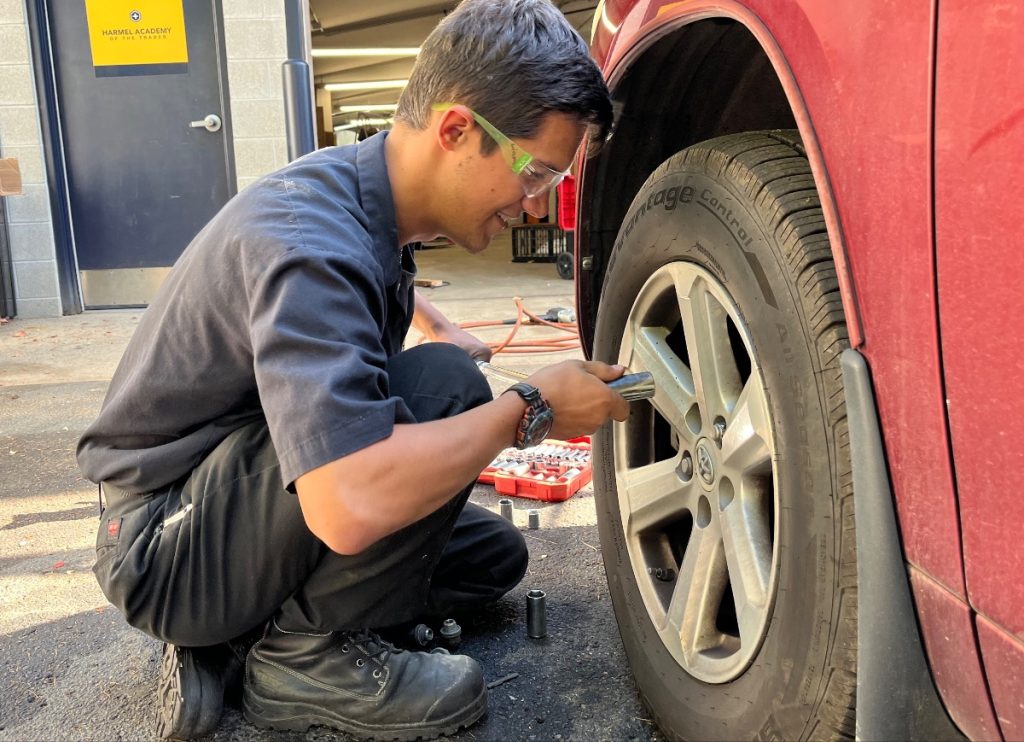

My father and brother are carpenters. My other brother is a plumber. I am a college professor. I thus naturally gravitated to Alex Sosler’s Plough article on schools that blend the life of the mind with the life of the trades. Here is a taste of “Schools for Philosopher-Carpenters”:
…Another example of a new school that pairs liberal arts with vocational training is Harmel Academy, a Catholic trade school for young men in Grand Rapids, Michigan. Harmel also developed out of a need. It was founded by tradesmen who were finding it difficult to find reliable, skilled workers. There are plenty of Catholic schools and colleges, but they wondered why there were no Catholic trade schools. So, in 2021, they founded one.
Since then, the question that animates the school has moved from “Why isn’t there a Catholic college that focuses on trades?” to “What do men need that they’re not getting in today’s world?” The first question addresses an economic or academic problem: “We need more tradesmen, so we’ll train them.” The latter gets closer to the root of a spiritual problem. Young men are not merely unequipped with skills or uneducated in the humanities. In the modern world, many are disconnected from their identity as human beings. As David Phelps, president of Harmel, has written, “What is needed is not simply curricula and conferences focused on the formation of men. What is needed is an integrated spirituality, a grounding of one’s manhood in the life and service of Christ.”
In the encyclical Laborem exercens, Pope John Paul II writes, “Work is a good thing for man – a good thing for his humanity – because through work man not only transforms nature, adapting it to his own needs, but he also achieves fulfillment as a human being and indeed, in a sense, becomes ‘more a human being.’” In discussing this with me, Phelps pointed to the incarnation of Christ. Christ was an apprentice to Joseph. He was a tradesman who learned by doing. His embodiment serves as an example of encountering and serving God in and through work. These are not only ideas or skills but a way of living and a way of seeing. Phelps is fond of quoting lines from Irenaeus: “For the glory of God is the living man” (Against Heresies, 4.20.7). But he also points out the line that follows, which isn’t quoted as often: “and the life of man is the vision of God.” Becoming fully alive is about seeing God, and encountering God happens in work – even in the trades – when work is prayer and an extension of worship.
If this emphasis sounds monastic, that’s because it is. Harmel Academy takes its scaffolding more from the monastic tradition than the Scholastic tradition. A typical day includes morning prayer and evening vespers. In between, students are learning in the workshops or completing twenty hours per week of on-the-job training. Over lunch, they may be working their way through one of their humanities courses. The humanities taught at Harmel are also centered on that paradigm of man: Jesus Christ. Because he is the perfect man, they learn the story of Jesus. They learn to be an apprentice of Jesus. Through discussion and application, they come to know ways of life, not merely theories. Students learn about a variety of callings: not just the call to a particular profession, but also the call to be a forgiven sinner and a saint, a brother and son, a neighbor, and perhaps a husband and father. The humanities sequence often starts with students’ passion – say viewing the movie Ford v Ferrari. How do all of these skilled workers come together to make something great? Then, the conversation may turn to an assigned reading in Aristotle or C. S. Lewis about friendship, and the students discuss what it means to be a good friend.
Read the entire piece here.
I would appreciate it if your computer program memorized my devices and I wasn’t forced to log in every so often.
Next time you log in click the “remember me” box.
As a philosopher and a carpenter, I love the idea of the philosopher-carpenter, but haven’t had the experience of an institution that nurtures them together.
Those of us in higher ed would do well to keep Crawford’s Shop Class/Soulcraft in mind (or going way back: Zen and the Art…)